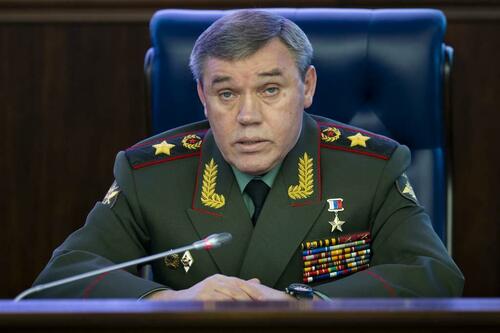
A lengthy and wide-ranging New York Times assessment of "Putin's War" detailing the last ten months of how a "walk in the park" became a catastrophe for Russia - as the story is sub headed - includes a particular bombshell buried deep within the narrative which has yet to be subject of widespread reporting.
US officials cited in the report say that Ukraine's military and intelligence attempted to assassinate General Valery Gerasimov, Chief of the General Staff of the Russian Armed Forces, even after American officials urged against such a brazen action of unpredictable consequences, on fears it would invite uncontrollable Russian military escalation.
While the key details embedded within the dozens of pages-long NYT Saturday report have received scant notice in broader US mainstream media, Russian state media has certainly already taken note, with TASS - among others - highlighting it.

The alleged Ukrainian attempt for a 'decapitation strike' on Russia's top commander and Putin's military right-hand during the planning phase involved Washington pleading for Kiev to call off an attack, only for US officials to find out they already launched it.
It reportedly happened in late April, during a time period in which unnamed American officials boasted that US intelligence was helping the Ukrainians take out Russian generals who were positioned on or just behind front-lines of fighting, as we detailed at the time.
In its new reporting, the Times says that last Spring, Russia's top military brass decided it was necessary for generals to make trips to the front lines due to worsening morale: "But the generals made a deadly mistake: They positioned themselves near antennas and communications arrays, making them easy to find, the Americans said." NYT describes further as follows in this key section of the report, thus allowing US intel to begin identifying top commanders' whereabouts on the Ukrainian battlefield:
"Ukraine started killing Russian generals, yet the risky Russian visits to the front lines continued. Finally, in late April, the Russian chief of the general staff, Gen. Valery Gerasimov, made secret plans to go himself."
The US apparently knew of the 'secret' trip in real-time, leading to the dilemma of whether to share the information with the Ukrainians. But the Times' sources say Washington "kept the information from the Ukrainians, worried they would strike."
The driving concern was that a provocation of that magnitude would increase the likelihood of direct war between nuclear-armed superpowers. The NY Times reveals what happened next:
The Ukrainians learned of the general’s plans anyway, putting the Americans in a bind. After checking with the White House, senior American officials asked the Ukrainians to call off the attack.
"We told them not to do it," a senior American official said. "We were like, ‘Hey, that’s too much.’"
The message arrived too late. Ukrainian military officials told the Americans that they had already launched their attack on the general's position.
Dozens of Russians were killed in the strike, officials said. General Gerasimov wasn’t one of them.
Gerasimov is the equivalent of Gen. Mark A. Milley, chairman of the US Joint Chiefs of Staff, the highest-ranking military officer...
The Ukrainian authorities tried to kill the Chief of the General Staff of the Armed Forces of the Russian Federation Valery Gerasimov, according to The New York Times https://t.co/QqQoh5uJx3 pic.twitter.com/XdAnOZBOc0
— vicktop (@vicktop555) December 17, 2022
And as the report concludes of that key time period of April to May, "Russian military leaders scaled back their visits to the front after that."
In May, unnamed senior American officials had begun leaking to US media greater intelligence-sharing with Kiev. This had reportedly led to the Ukrainians having killed in pinpoint strikes an estimated 12 Russian generals, which during those opening months of the invasion was an astonishingly high number (given the rarity in any war of deaths from among these highest officer ranks).
The month prior to that, Defense Secretary Lloyd J. Austin bluntly admitted of policy aims in Ukraine that the US wants to see a greatly "weakened" Russia. "We want to see Russia weakened to the degree it cannot do the kinds of things that it has done in invading Ukraine," he had said at the time.
If the Ukrainians had managed to kill Gen. Gerasimov, it's very possible the world could have already been in the throes of nuclear Armageddon. But thankfully this scenario until now has been avoided, but very narrowly ...if the fresh NYT revelations are indeed accurate.
A lengthy and wide-ranging New York Times assessment of “Putin’s War” detailing the last ten months of how a “walk in the park” became a catastrophe for Russia – as the story is sub headed – includes a particular bombshell buried deep within the narrative which has yet to be subject of widespread reporting.
US officials cited in the report say that Ukraine’s military and intelligence attempted to assassinate General Valery Gerasimov, Chief of the General Staff of the Russian Armed Forces, even after American officials urged against such a brazen action of unpredictable consequences, on fears it would invite uncontrollable Russian military escalation.
While the key details embedded within the dozens of pages-long NYT Saturday report have received scant notice in broader US mainstream media, Russian state media has certainly already taken note, with TASS – among others – highlighting it.

The alleged Ukrainian attempt for a ‘decapitation strike’ on Russia’s top commander and Putin’s military right-hand during the planning phase involved Washington pleading for Kiev to call off an attack, only for US officials to find out they already launched it.
It reportedly happened in late April, during a time period in which unnamed American officials boasted that US intelligence was helping the Ukrainians take out Russian generals who were positioned on or just behind front-lines of fighting, as we detailed at the time.
In its new reporting, the Times says that last Spring, Russia’s top military brass decided it was necessary for generals to make trips to the front lines due to worsening morale: “But the generals made a deadly mistake: They positioned themselves near antennas and communications arrays, making them easy to find, the Americans said.” NYT describes further as follows in this key section of the report, thus allowing US intel to begin identifying top commanders’ whereabouts on the Ukrainian battlefield:
“Ukraine started killing Russian generals, yet the risky Russian visits to the front lines continued. Finally, in late April, the Russian chief of the general staff, Gen. Valery Gerasimov, made secret plans to go himself.”
The US apparently knew of the ‘secret’ trip in real-time, leading to the dilemma of whether to share the information with the Ukrainians. But the Times’ sources say Washington “kept the information from the Ukrainians, worried they would strike.”
The driving concern was that a provocation of that magnitude would increase the likelihood of direct war between nuclear-armed superpowers. The NY Times reveals what happened next:
The Ukrainians learned of the general’s plans anyway, putting the Americans in a bind. After checking with the White House, senior American officials asked the Ukrainians to call off the attack.
“We told them not to do it,” a senior American official said. “We were like, ‘Hey, that’s too much.’”
The message arrived too late. Ukrainian military officials told the Americans that they had already launched their attack on the general’s position.
Dozens of Russians were killed in the strike, officials said. General Gerasimov wasn’t one of them.
Gerasimov is the equivalent of Gen. Mark A. Milley, chairman of the US Joint Chiefs of Staff, the highest-ranking military officer…
The Ukrainian authorities tried to kill the Chief of the General Staff of the Armed Forces of the Russian Federation Valery Gerasimov, according to The New York Times https://t.co/QqQoh5uJx3 pic.twitter.com/XdAnOZBOc0
— vicktop (@vicktop555) December 17, 2022
And as the report concludes of that key time period of April to May, “Russian military leaders scaled back their visits to the front after that.”
In May, unnamed senior American officials had begun leaking to US media greater intelligence-sharing with Kiev. This had reportedly led to the Ukrainians having killed in pinpoint strikes an estimated 12 Russian generals, which during those opening months of the invasion was an astonishingly high number (given the rarity in any war of deaths from among these highest officer ranks).
The month prior to that, Defense Secretary Lloyd J. Austin bluntly admitted of policy aims in Ukraine that the US wants to see a greatly “weakened” Russia. “We want to see Russia weakened to the degree it cannot do the kinds of things that it has done in invading Ukraine,” he had said at the time.
If the Ukrainians had managed to kill Gen. Gerasimov, it’s very possible the world could have already been in the throes of nuclear Armageddon. But thankfully this scenario until now has been avoided, but very narrowly …if the fresh NYT revelations are indeed accurate.
Loading…






